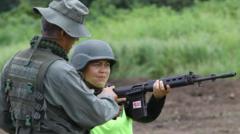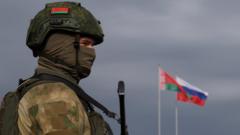Is Venezuela Really Sending Drugs and Gang Members as Tensions Escalate?

Published: 2025-09-15 14:10:44 | Category: world
The ongoing tensions between the United States and Venezuela have intensified as US President Donald Trump has reiterated allegations that Venezuela is exporting gang members and narcotics to the US. This situation has escalated following military activities in the Southern Caribbean aimed at counter-narcotics operations. Concerns about legality and potential conflict have arisen in response to these developments.
Last updated: 18 October 2023 (BST)
Key Takeaways
- Trump claims Venezuela is sending drugs and gang members to the US.
- The US has launched military operations in the Southern Caribbean.
- Concerns about the legality of US actions have been raised.
- Venezuela has responded with military displays and accusations against the US.
- The US does not recognise Nicolás Maduro's recent election victory.
Background of US-Venezuela Relations
The relationship between the US and Venezuela has been fraught with tension for several years, primarily due to differing political ideologies and accusations of human rights abuses. Venezuela’s government, led by Nicolás Maduro, has been accused by the US of being involved in drug trafficking and supporting anti-American terrorism. These accusations have contributed to a broader narrative of hostility between the two nations.
President Trump's Renewed Accusations
During a recent press conference, President Trump reiterated his administration's stance that Venezuela is a significant contributor to drug trafficking and gang violence in the US. He stated, “Venezuela is sending us their gang members, their drug dealers and drugs,” highlighting the perceived threat that the Venezuelan government poses to US national security. This rhetoric aligns with previous statements made by Trump regarding Latin American countries and their alleged connections to crime and drug trade.
US Military Operations in the Southern Caribbean
The US has intensified its military presence in the Southern Caribbean, deploying warships under the guise of counter-narcotics operations. This strategy aims to disrupt the flow of illegal drugs entering the US, particularly from Venezuela. On 2 September, a US military operation led to the attack on a vessel believed to be transporting drugs from Venezuelan waters. The incident resulted in the deaths of all 11 individuals aboard, raising serious concerns about the legality of such military actions under international law.
Legal Concerns Surrounding Military Actions
Experts have voiced concerns regarding the legality of the US's military engagement in international waters, suggesting that the attack on the drug boat may violate international law. The United Nations Convention on the Law of the Sea, which governs maritime conduct, stipulates that military actions must adhere to principles of sovereignty and self-defence. Critics argue that the US's unilateral military interventions could set a dangerous precedent and destabilise the region further.
Venezuela’s Military Response
In response to the US military operations, Venezuelan authorities displayed their military capabilities by flying two F-16 fighter jets over a US Navy destroyer. This show of force was interpreted as a direct warning to the US, suggesting that Venezuela is prepared to defend its sovereignty against what it perceives as aggressive actions by the American military. Trump responded with a stern warning that any Venezuelan aircraft endangering US forces would be shot down, heightening the risk of a military confrontation.
Recent Accusations from Venezuela
On Saturday, Venezuelan Foreign Minister Yván Gil accused US forces of illegally boarding a Venezuelan fishing vessel, which he described as "small" and "harmless." The incident, lasting eight hours, sparked outrage in Caracas, with government officials claiming it was an act of aggression aimed at provoking a conflict. The Venezuelan foreign ministry asserted that the US is seeking to create incidents that could justify a military escalation in the region, potentially serving the interests of regime change in Venezuela.
The Political Landscape in Venezuela
The political landscape in Venezuela remains highly contentious, especially following the July 2024 re-election of Nicolás Maduro. The US and several allied nations, including the UK, have refused to recognise Maduro's victory, asserting that evidence indicates his opponent, Edmundo González, won the election convincingly. This refusal to acknowledge the legitimacy of Maduro's government has led to a continuation of sanctions and diplomatic isolation, exacerbating the country’s economic crisis.
Accusations of Drug Trafficking
US officials have accused Maduro of operating a drug trafficking organisation, dubbed the “Cartel of the Suns.” The US government has placed a $50 million (£37 million) bounty on Maduro’s head, seeking information that could lead to his arrest. Maduro has vehemently denied these allegations, labelling them as part of an "imperialist" strategy by the US to undermine his government and instigate regime change. In a bid to bolster national defence, he has called upon Venezuelans to join the militia, a civilian force often mobilised during political events.
Conclusion: What Lies Ahead?
The ongoing tensions between the US and Venezuela raise critical questions about the future of US foreign policy in Latin America and the potential for military conflict. As both countries continue to escalate their rhetoric and military posturing, the risk of miscalculation increases. The international community watches closely, aware that actions taken now could have far-reaching implications for regional stability and international law.
What measures can be taken to de-escalate the situation? The path forward may require diplomatic engagement and a renewed commitment to dialogue amidst rising tensions. How will the actions of both nations shape the geopolitical landscape moving forward? #USVenezuelaRelations #MilitaryOperations #InternationalLaw
FAQs
What allegations has President Trump made against Venezuela?
President Trump has accused Venezuela of sending gang members and drugs to the United States, claiming that this behaviour is unacceptable and poses a threat to national security.
What military actions has the US taken against Venezuela?
The US has deployed warships to the Southern Caribbean and conducted military operations, including an attack on a vessel suspected of transporting drugs from Venezuela, resulting in the deaths of 11 individuals.
How has Venezuela responded to US military operations?
Venezuela has showcased its military capabilities by flying fighter jets over US Navy vessels and accused US forces of illegally boarding a Venezuelan fishing boat, escalating tensions further.
What is the current political situation in Venezuela?
The political situation remains volatile following the disputed re-election of Nicolás Maduro. The US and several allied nations do not recognise the legitimacy of his government, citing evidence of electoral fraud.
What are the implications of US actions in Venezuela?
The US's military operations and accusations of drug trafficking could lead to increased hostilities and potential military conflict, impacting regional stability and international relations.



